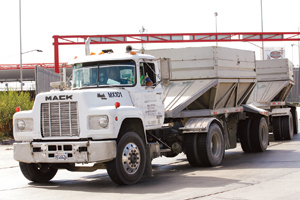Teamsters, Safety Groups Sue DOT Over Opening Border to Mexican Carriers

The suit was filed March 10 in the U.S. Court of Appeals for the Ninth Circuit, which covers California and several other Western states.
The safety groups are the Advocates for Highway and Auto Safety and the Truck Safety Coalition, the notice of the suit said.
The suit, according to the Teamsters, contends the border opening was not warranted because DOT’s justification for opening it did not meet the specifications Congress set down when it agreed to a pilot program for Mexican truckers.
The pilot ended in October, and DOT sent the required report on the program to Congress. But the report “violated” the federal Administrative Procedures Act because its conclusion that it was safe to open the border was “arbitrary and capricious in light of the admitted lack of significant data” from the pilot program, the Teamsters said.
Only 13 Mexican carriers were in the pilot, a number that another report, this one from the U.S. Inspector General, said was insufficient to draw conclusions about whether Mexican trucks were safe enough for U.S. highways.
“It is disappointing that the DOT has chosen to ignore the findings of the Inspector General and is moving forward with opening the border to Mexican trucks,” Teamsters President Jim Hoffa said in the union statement. “The Teamsters union will continue to fight for highway safety; the safety of our roads cannot be compromised based on this failed program,” he said.
Duane DeBruyne, spokesman for the Federal Motor Carrier Safety Administration, said: "As a matter of department policy, we do not comment on litigation." FMCSA oversaw the Mexican truck pilot program and is named as a defendant in the suit.
Transportation Secretary Anthony Foxx has said DOT had sufficient data from the pilot and from another DOT program to conclude the border could be safely opened.
Under the second program, about 700 Mexican-owned trucking companies have headquartered in the United States and run under U.S. rules governing trucking operations.
The dispute over Mexican carriers running in the United States dates back two decades to the North American Free Trade Agreement, under which the U.S. agreed to open the border to Mexican carriers.
The opening, however, has been opposed by those suing and by some members of Congress, which lead the Obama administration to set up the now-ended pilot program.
Although U.S. officials said the border opening this year finally brings the country in compliance with Nafta, Mexican trucking leaders recently told Transport Topics that they are still not being treated fairly.
Representatives of CANACAR, the Mexican trucking industry trade organization, told Transport Topics that the trade group plans to file a complaint against the United States under Nafta because Mexican carriers are subjected to more mandatory safety inspections than are U.S. or Canadian carriers.
The Teamsters said Hoffa has sent a letter to U.S. Trade Representative Michael Froman that calls on the administration “to protect highway safety and reopen negotiations over Mexican cross-border trucking as part of the ongoing Trans Pacific Partnership talks.”




